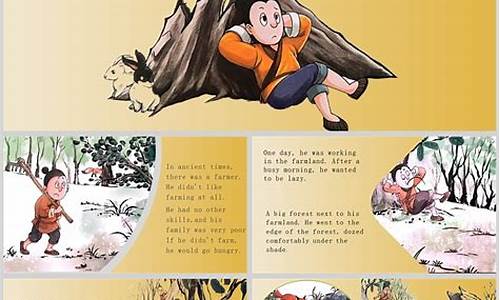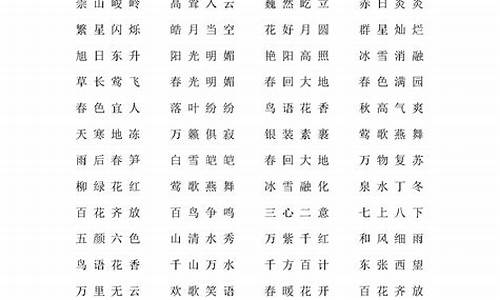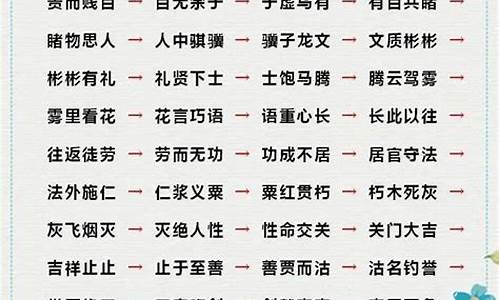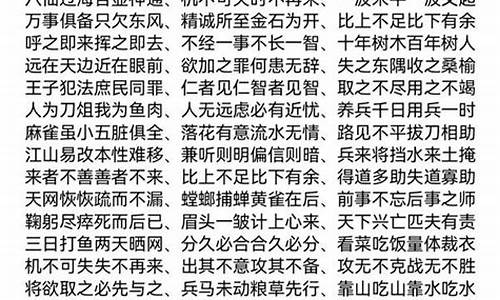您现在的位置是: 首页 > 成语查询大全 成语查询大全
成语故事英语演讲稿三分钟初中带翻译_成语故事英语演讲稿三分钟初中带翻译
ysladmin 2024-05-15 人已围观
简介成语故事英语演讲稿三分钟初中带翻译_成语故事英语演讲稿三分钟初中带翻译 下面,我将为大家展开关于成语故事英语演讲稿三分钟初中带翻译的讨论,希望我的回答能够解决大家的疑问。现在,让我们开始聊一聊成语故事英语演讲稿三分钟初中带翻译的问题。1
下面,我将为大家展开关于成语故事英语演讲稿三分钟初中带翻译的讨论,希望我的回答能够解决大家的疑问。现在,让我们开始聊一聊成语故事英语演讲稿三分钟初中带翻译的问题。
1.英语英语成语故事之自相矛盾
2.写一篇七十字左右愚公移山的读后感英语作文带翻译
3.我要读英语作文,麻烦给我找篇关于成语故事的英语短文,短一点的,我是初一的,别太难
4.英语的成语故事
5.急求一个英语的成语故事!!!

英语英语成语故事之自相矛盾
自相矛盾
A man of the state of Chu (chǔ guó 楚国) had a spear and a shield for sale.
楚国有个卖兵器的人,在市场上卖矛和盾。
He was loud in praises of his shield."My shield is so strong that nothing can pierce it through."
为了让人家愿意买他的货,他先举起盾向人们夸口道:“你们看,我的盾是世上最坚固的盾,任何锋利的东西都不能刺穿它。”
He also sang praises of his spear."My spear is so strong that it can pierce through anything."
接着又举起他的矛,向人吹嘘说:“你们再看看我的矛,它锋利无比,无坚不摧,无论多么坚硬的盾,都挡不住它,一刺就穿!”
"What would happen," he was asked, "if your spear is used to pierce your shield?"
人群中有人问道:“如果用你的矛去刺你的盾,结果怎么样?”
It is impossible for an impenetrable shield to coexist with a spear that finds nothing impenetrable.
这世界上一样无坚不摧的东西永远不会与一样什么都能摧毁的东西共存。
写一篇七十字左右愚公移山的读后感英语作文带翻译
Sweat is HuoGuang, emperor han commander-in-chief of TuoGu ministers, drinking eight years of emperor han style-came kisen, ruling pomp very heavy. HuoGuang nearby have a call YangChang people, act is timid, popular with HuoGuang recognition, rose to prime minister position, seal for anping syndrome. Actually, YangChang humanness cowardly incompetence, timid, not when the prime minister of the material. 74 B.C., was only twenty one-year-old han emperor died.both in WeiYangGong kisen, with all the princes HuoGuang counsel, chose the emperor's grandson made WangLiuHe nearbu heir. Behold LiuHe ascended the mid-north song and dance, often pleasure-resorts. HuoGuang heard later, anxieties, and bike ride general ZhangAn births, TianYanNian secret counsel, on to nullify LiuHe, set up other Yin jun. After TianYanNian HuoGuangPa goading agreed to jointly YangChang, tell gun. YangChang all of a sudden, she was scared to sweat, panic, just something indistinctly fence. YangChang wife, is TaiShiGong sima qian's daughter, quite have the guts. She saw her husband shilly-shally appearance, secretly worried, while TianYanNian change clothes walk away, infero-anterior advised her husband and said, "National affairs, will shilly-shally. General has ChengYi, you should also chosin reservoir, otherwise inevitable difficult ahead." YangChang step back and forth in the house, but had no acid attention. Just at this time TianYanNian back, SiMaFu people avoid inferior, straight-tempered without embarrassment and TianYanNian meet, told TianYanNian, her husband willing to listen to the general's command. TianYanNian after listening pleased to take leave walk. TianYanNian returns HuoGuang, HuoGuang very satisfied. YangChang brought all the princes immediately arrange table, playing please dowager. The next day, YangChang advice, ernie see luang nearbu king unbearable successin statement of reason. Queen letter removed immediately LiuHe, another sign of emperor of the once SunLiu enquiry for jun, was said han XuanDi.
Idioms citations, han shu YangChang biography of our afraid, not words. Jia sweated back ACTS yes just.
Idioms interpretations ", "Jia drenched, sweating much soaked backbone. Describe sweat. Also describe extreme fear or ashamed excessive.
汗流浃背 汉大将军霍光,是汉武帝的托孤重臣,辅佐八岁即位的汉昭帝执政,威势很重。霍光身边有个叫杨敞的人,行事谨小慎微,颇受霍光赏识,升至丞相职位,封为安平候。其实,杨敞为人懦弱无能,胆小怕事,根本不是当丞相的材料。公元前74年,年仅廿一岁的汉昭帝驾崩于未央宫,霍光与众臣商议,选了汉武帝的孙子昌邑王刘贺作继承人。谁知刘贺继位后,经常宴饮歌舞,寻欢作乐。霍光听说后,忧心忡忡,与车骑将军张安世、大司马田延年秘密商议,打算废掉刘贺,另立贤君。计议商定后,霍光派田延年告诉杨敞、以便共同行事。杨敞一听,顿时吓得汗流浃背,惊恐万分,只是含含糊糊,不置可否。杨敞的妻子,是太史公司马迁的女儿,颇有胆识。她见丈夫犹豫不决的样子,暗暗着急,趁田延年更衣走开时,上前劝丈夫说;“国家大事,岂能犹豫不决。大将军已有成议,你也应当速战速决,否则必然太难临头。”杨敞在房里来回酸步,却拿不定注意。正巧此时田延年回来,司马夫人回避不及,索性大大方方地与田延年相见,告知田延年,她丈夫愿意听从大将军的吩咐。田延年听了后高兴地告辞走了。田延年回报霍光,霍光十分满意,马上安排杨敞领众臣上表,奏请皇太后。第二天,杨敞与群臣遏见皇太后,陈述昌邑王不堪继承王位的原因。太后立即下诏废去刘贺,另立汉武帝的曾孙刘询为君,史称汉宣帝。
成语出处《汉书·杨敞传》敝惊惧,不知所言。汗出浃背徒唯唯而已。
成语释义“浃”,湿透,出汗多,湿透脊梁。形容满身大汗。也形容极度惶恐或惭愧过度。
我要读英语作文,麻烦给我找篇关于成语故事的英语短文,短一点的,我是初一的,别太难
首先简要叙述原文内容,对所读的故事做一个简要的概述。写作部分主要是为写自己的感想做一个前期铺垫。正文:Today, I read the idiom "Yugong moves mountains". This story tells the story of an old man named Yugong who was nearly 90 years old in ancient times. Because there were two mountains at the door of his home, it was very inconvenient for his family to get in and out.
今天,我读了《愚公移山》这个成语故事。这个故事讲了古代一位年近九十名叫愚公的老人,因为家门口有两座大山挡着,令一家人出入很不方便。
So Yu Gong mobilized his family to remove the two mountains. In this way, Yu Gong and his sons and grandsons began to dig the mountain diligently. There was an old man named Zhisou who laughed at Yugong for being too stupid and thought that it was impossible to level the two mountains with his age and strength.
于是,愚公动员全家人要把这两座大山搬掉。就这样,愚公和他的子孙勤勤恳恳地开始挖山。有个叫智叟的老头却嘲笑愚公太傻,认为凭愚公的年纪和力气是不可能挖平两座大山的。
But Yu Gong said, "when I die, I still have a son. When my son dies, I still have a grandson. There is no end to the generations. The mountain will not grow high. Are you afraid that you can't remove it?" Later, Yugong's sincerity and spirit moved the emperor, who sent two immortals to carry the two mountains. Yugong's wish finally came true.
愚公却说:“我死了,还有儿子,儿子死了还有孙子,子子孙孙无穷无尽,山又不会长高,还怕搬不掉吗?”后来,愚公的诚意和精神感动了天帝,天帝派了两个神仙背走了那两座大山。愚公的愿望终于实现了。
After reading this story, I learned that when I do anything, I must be persistent. I can't give up halfway. When I think about my study, I sometimes encounter problems that I can't do, so I don't want to do them. I just choose the problems that I can do. It's wrong to flinch when you encounter difficulties. Just like Yu Gong, you should not be afraid of difficulties, go forward bravely, and strive to overcome all kinds of difficulties in your study and life.
读了这个故事,让我懂得了在做任何事情时都要有恒心,做事不能半途而废,想想我自己在学习上有时遇到不会做的难题就不想做了,只挑自己会做的题目做。遇到难题就退缩,这样是不对的,要像愚公一样,不怕困难,勇往直前,努力战胜学习和生活中遇到的各种困难。
英语的成语故事
Peaches and Plums Do Not Have to Talk, Yet the World Beats a Path to Them--Natural Attraction(桃李不言,下自成蹊)
Duing the Western Han Dynasty(206 B.C.- A.D.24)Period, there was a very famous general whose name was Li Guang. He was very brave and skillful in battle, and had fought more than seventy battles with the Huns, an ancient nationality in China.Having made brilliant achievements in war, he was deeply loved and esteemed by the officers and men as well as the common people. However,he did not claim credit for himself and become arrogant,although he held a high post,commanding a big army,and had rendered outstanding service in defending the county. He was not only polite and amiable, but also shared weal and woe with the soldiers. He always had the troops under his commandat heart,and whenever gifts were bestowed to him by the imperial government,he distributed the gifts to his officers and men. When marching, he endured the torments of hunger and thirst as the soldiers did when food and water were in short supply. When fighting, he charged at the head of his men,and ,when he gave the order,every soldier advanced bravely to engage in fighting,not fearing death.
When the sad news of the heath of General Li Guang reached the militaty camp,the officers and men of the whole army wept bitterly.
西汉时候,有一位勇猛善战的将军,名叫李广,一生跟匈奴打过七十多次仗,战功卓著,深受官兵和百姓的爱戴。李广虽然身居高位,统领千军万马,而且是捍卫国度的功臣,但他一点也不居功自傲。他不仅待人和睦,还能和士兵同甘共苦。每次朝廷给他的赏赐,他首先想到的是他的部下,就把那些赏赐统统分给官兵们;行军打仗时,遇到粮食或水供给不上的情况,他自己也同士兵们一样忍饥挨饿;打起仗来,他身先士卒,英勇顽强,只要他一声令下,大家个个奋勇杀敌,不握牺牲。这是一位多么让人崇敬的大将军啊!
后来,当李广将军去世的噩耗传到军营时,全军将士无不痛哭流涕,连许多与大将军平时并不熟悉的百姓也纷纭悼念他。在人们心目中,李广将军就是他们崇拜的大好汉。
汉朝伟大的史学家司马迁在为李广立传时称赞道:“桃李不言,下自成蹊。”意思是说,桃李有着芳香的花朵,甜美的果实,虽然它们不会说话,但仍然会吸引人们到树下赏花尝果,以至树下都走出一条小路,李广将军就是以他的真诚和高贵的品质赢得了人们的崇敬。
急求一个英语的成语故事!!!
画蛇添足
An official of the ancient State of Chu awarded a pot of wine to his men after the ceremony of Spring Sacrifice. One man said, “We have only one pot of wine. It's not enough for all of us but sufficient for one. Let's determine who'll have the wine by drawing a snake on the ground. He who finishes first will have the wine.”
The others agreed. Very soon, one man finished his snake. He was about to drink the wine when he saw the others were still busy drawing. He said complacently,“How slowly you are! I still have enough time to add feet to my snke.” But before he finished the feet, another man finished his snke and grabbed the pot from him, saying,“Whoever has seen a snake with feet? Yours is not a snke. So the wine should be mine!” He drank the wine. The man adding the feet to the snake had to give in and could only regret his foolishness.
楚国有一个官员,在春天祭过了祖宗之后,便将一壶酒赏给他的办事人员喝。有人提议:“我们只有一壶酒,肯定不够我们大家喝的,一个人喝倒是绰绰有余。我们每人在地上画一条蛇,谁画得最快,就把这壶酒给他。” 大家都同意了。
有一个人很快就把蛇画好了。他正打算喝这壶酒时,看见别人都还忙着画呢。他就得意扬扬地说:“你们画得好慢呀,等我再画上几只脚吧!” 他的蛇脚还没画完,另一个人已经把蛇画好了。那人把酒壶夺了过去说:“有谁见过长脚的蛇?你画的不是蛇,这壶酒应该是我的了。”说罢,就喝起酒来。那个给蛇画脚的人没办法,只能懊悔自己的愚蠢。
一鸣惊人
In the Warring States Period, Duke Wei of Qi neglected state affairs, for the first three years of his reign, giving himself over to dissipation. One of his ministers, Chun Yukun who had a good sense of humour, said to him: 'There is a big bird which has neither taken wing nor sung for three years.' The duke answered, 'Once that bird starts to fly and sing, it will astonish the world.' The duke thereupon devoted himself to his duties and built his state up into a powerful one.
战国时代,齐威王即位后做了三年国君,只顾享乐,不理政事。有个善于说笑话的人叫淳于髡,一天对齐威王说:“城里有一只大鸟,三年不飞也不叫,你知道这是什么道理?”齐威王说:“这鸟不飞则罢,一飞就冲天;不鸣则罢,一鸣就惊人。”在淳于髡的激发下,齐威王开始治理国家,取得很大成绩,齐国的声威一直保持了几十年。
杞人忧天
In the Spring and Autumn Period, in the State of Qi there was a man who always let his imagination run away with him. One day he even worried that the sky would fall on his head. He was so worried that he could neither eat nor sleep. Later, someone persuaded him that his fears were Ground-less.
春秋时代,杞国有一个喜欢胡思乱想的人。一天,他竟然想到,天会塌下来,地会陷下去,自己到哪里去安身?这个人越想越害怕,整天愁眉苦脸,坐立不安,白天吃不下饭,晚上睡不着觉。后来有人耐心地开到他,他才放下了心。
精卫填海
Once upon a time, the youngest daughter of Emperor Yan, legendary ruler of primitive China, went boating on the Eastern Sea. While she was enjoying herself, a strong wind rose on the sea and her boat capsized. Just before she was buried by the surging waves, her spirit turned into a beautiful bird. As it flew over the roaring sea, it cried sadly in the sound "jinwei, jingwei". That was why people called it "Jingwei".
The bird lived on a mountain near the sea. It hated the sea so much that it decided to fill it up. Every day, it flew to and fro between the mountain and the sea, carrying in a twig or a pebble from the mountain and dropping it into the sea.
One day, the roaring sea said to Jingwei, "Poor little bird, stop doing that meaningless thing! You'll never fill me up." Jingwei replied, "I'll fill you up no doubt! I will, even if it'll take me thousands of years! I'll fight on until doomsday!"
The brave little bird kept carrying twigs and pebbles from the mountain to the Eastern Sea without taking a rest.
From this fable comes the idiom "The bird Jingwei trying to fill the sea". We use it to describe people who are firm and indomitable and will not stop until they reach their goal.
从前,炎帝(传说中中国原始社会的统治者)的小女儿在东海上划船。正当她划得高兴时,海面上突然升起一阵大风,把她的小船弄翻了。就在她要被汹涌的波浪吞 没时,她的灵魂变成了一只美丽的小鸟。它飞过那咆哮的海面,伤心的叫着"精卫,精卫"的声音。所以人们就叫她"精卫"。
精卫鸟住在靠海的一座山上。它非常恨大海,所以决心要把它填平。它每天来回于山海之间,把从山上衔来的小树枝和小石子扔在大海里。
一天,咆哮的大海对精卫说:"可怜的小鸟,停止你那无谓的举动吧!你是永远都填不平我的。" 精卫回答说:"我当然会把你填平的!即使这需要千千万万年的时间,我也一定会斗争到底,直到你的末日来临!"
这只勇敢的小鸟继续从山上衔来小树枝和小石子,扔到东海中,从未有片刻休息。
"精卫填海"这个成语就是由这个传说而来的,形容那些坚定不移,不屈不挠,不到目的决不罢休的人。
1.An Apple of Discord争斗之源;不和之因;祸根
An Apple of Discord直译为“纠纷的苹果”,出自荷马史诗Iliad中的希腊神话故事
传说希腊阿耳戈英雄(Argonaut)珀琉斯(Peleus)和爱琴海海神涅柔斯的女儿西蒂斯(Thetis)在珀利翁山举行婚礼,大摆宴席。他们邀请了奥林匹斯上(Olympus)的诸神参加喜筵,不知是有意还是无心,惟独没有邀请掌管争执的女神厄里斯(Eris)。这位女神恼羞成怒,决定在这次喜筵上制造不和。于是,她不请自来,并悄悄在筵席上放了一个金苹果,上面镌刻着“属于最美者”几个字。天后赫拉(Hera),智慧女神雅典娜(Athena)、爱与美之神阿芙罗狄蒂(Aphrodite),都自以为最美,应得金苹果,获得“最美者”称号。她们争执不下,闹到众神之父宙斯(Zeus)那里,但宙斯碍于难言之隐,不愿偏袒任何一方,就要她们去找特洛伊的王子帕里斯(Paris)评判。三位女神为了获得金苹果,都各自私许帕里斯以某种好处:赫拉许给他以广袤国土和掌握富饶财宝的权利,雅典娜许以文武全才和胜利的荣誉,阿芙罗狄蒂则许他成为世界上最美艳女子的丈夫。年青的帕里斯在富贵、荣誉和美女之间选择了后者,便把金苹果判给爱与美之神。为此,赫拉和雅典娜怀恨帕里斯,连带也憎恨整个特洛伊人。后来阿芙罗狄蒂为了履行诺言,帮助帕里斯拐走了斯巴达国王墨涅俄斯的王后---绝世美女海伦(Helen),从而引起了历时10年的特洛伊战争。不和女神厄里斯丢下的那个苹果,不仅成了天上3位女神之间不和的根源,而且也成为了人间2个民族之间战争的起因。因此,在英语中产生了an apple of discord这个成语,常用来比喻any subject of disagreement and contention;the root of the trouble;dispute等意义
这个成语最初为公元2世纪时的古罗马历史学家马克·朱里·尤斯丁(Marcus Juninus Justinus)所使用,后来广泛的流传到欧洲许多语言中去,成为了一个国际性成语。
eg: He throwing us an apple of discord,we soon quarrelled again.
The dispute about inheriting estate formed an apple of discord between them.
This problem seems to be an apple of discord between the Soviet union and the USA.
2.The Heel of Achilles 亦作The Achilles' Heel唯一弱点;薄弱环节;要害
The Heel of Achilles直译是“阿基里斯的脚踵”,是个在欧洲广泛流行的国际性成语。它源自荷马史诗Iliad中的希腊神话故事。
阿基里斯是希腊联军里最英勇善战的骁将,也是荷马史诗Iliad里的主要人物之一。传说他是希腊密耳弥多涅斯人的国王珀琉斯和海神的女儿西蒂斯所生的儿子。阿基里斯瓜瓜坠地以后,母亲想使儿子健壮永生,把他放在火里锻炼,又捏着他的脚踵倒浸在冥河(Styx)圣水里浸泡。因此阿基里斯浑身象钢筋铁骨,刀枪不入,只有脚踵部位被母亲的手捏住,没有沾到冥河圣水,成为他的唯一要害。在特洛伊战争中,阿基里斯骁勇无敌,所向披靡,杀死了特洛伊主将,著名英雄赫克托耳(Hector),而特洛伊的任何武器都无法伤害他的身躯。后来,太阳神阿波罗(Apollo)把阿基里斯的弱点告诉了特洛伊王子帕里斯,阿基里斯终于被帕里斯诱到城门口,用暗箭射中他的脚踵,负伤而死。
因此,the heel of Achilles,也称the Achilles' heel,常用以表示a weak point in something that is otherwise without fault;the weakest spot等意思。
eg:The shortage of fortitude is his heel of Achilles.
His Achilles' heel was his pride--he would get very angry if anyone criticized his work.
3.Helen of Troy
Helen of Troy 直译"特洛伊的海伦",源自源自荷马史诗Iliad中的希腊神话故事。
Helen是希腊的绝世佳人,美艳无比,嫁给希腊南部邦城斯巴达国王墨涅俄斯(Menelaus)为妻。后来,特洛伊王子帕里斯奉命出事希腊,在斯巴达国王那里做客,他在爱与美之神阿芙罗狄蒂的帮助下,趁着墨涅俄斯外出之际,诱走海伦,还带走了很多财宝
此事激起了希腊各部族的公愤,墨涅俄斯发誓说,宁死也要夺回海轮,报仇雪恨。为此,在希腊各城邦英雄的赞助下,调集十万大军和1180条战船,组成了希腊联军,公推墨涅俄斯的哥哥阿枷门农(Agamemnon)为联军统帅,浩浩荡荡,跨海东征,攻打特洛伊城,企图用武力夺回海轮。双方大战10年,死伤无数,许多英雄战死在沙场。甚至连奥林匹斯山的众神也分成2个阵营,有些支持希腊人,有些帮助特洛伊人,,彼此展开了一场持久的恶斗。最后希腊联军采用足智多谋的奥德修斯(Odusseus)的“木马计”,里应外合才攻陷了特洛伊。希腊人进城后,大肆杀戮,帕里斯王子也被杀死,特洛伊的妇女、儿童全部沦为奴隶。特洛伊城被掠夺一空,烧成了一片灰烬。战争结实后,希腊将士带着大量战利品回到希腊,墨涅俄斯抢回了美貌的海轮重返故土。这就是特洛伊战争的起因和结局。正是由于海轮,使特洛伊遭到毁灭的悲剧,真所谓“倾国倾城”,由此产生了Helen of Troy这个成语。
特洛伊战争的真实性,已为19世纪德国考古学家谢里曼在迈锡尼发掘和考证古代特洛伊古城废墟所证实。至于特洛伊城被毁的真正原因,虽然众说纷纭,但肯定决不是为了一个美女而爆发这场战争的,与其说是为了争夺海轮而打了起来,毋宁说是为了争夺该地区的商业霸权和抢劫财宝而引起战争的。所谓“特洛伊的海伦”,实质上是财富和商业霸权的化身。中国历史上也有过“妲己亡商”,“西施沼吴”等传说,以及唐明皇因宠杨贵妃而招致“安史之乱”,吴三桂“冲冠一怒为红颜”等说法。汉语中有个“倾国倾城”的成语(语出《汉书·外戚传》:‘一顾倾人城,再顾倾人国’。)这里的“倾”字一语双光,既可指美艳非凡,令人倾倒;也可纸倾覆邦国。其含义与Helen of troy十分近似。
在现代英语中,Helen of Troy这个成语,除了表示a beautiful girl or woman;a beauty who ruins her country等意义外,还可以用来表示a terrible disaster brought by sb or sth you like best的意思。
eg:It is unfair that historians always attribute the fall of kingdoms to Helen of Troy.
She didn't think of the beautiful umbrella bought the day before should become a Helen of Troy in her family.Because of this she and her husband quarreled for a long time.
今天的讨论已经涵盖了“成语故事英语演讲稿三分钟初中带翻译”的各个方面。我希望您能够从中获得所需的信息,并利用这些知识在将来的学习和生活中取得更好的成果。如果您有任何问题或需要进一步的讨论,请随时告诉我。







